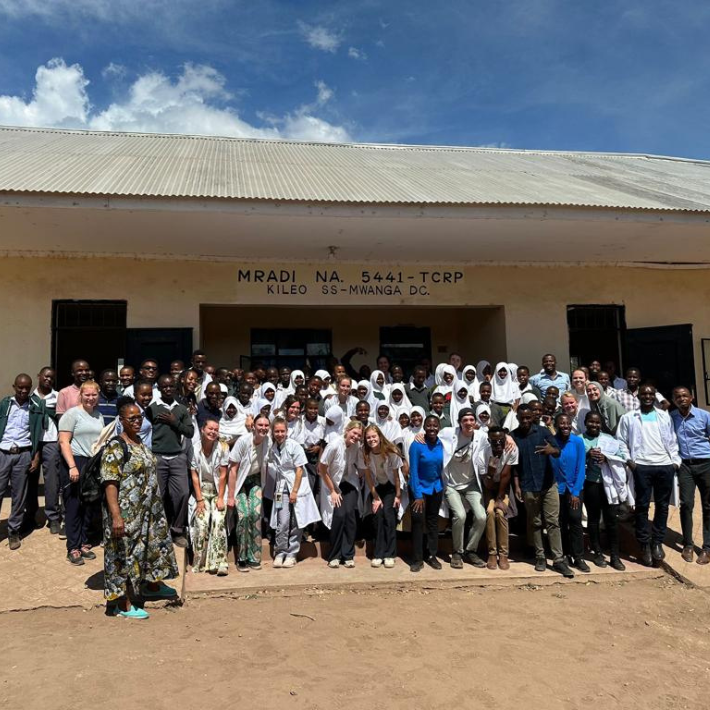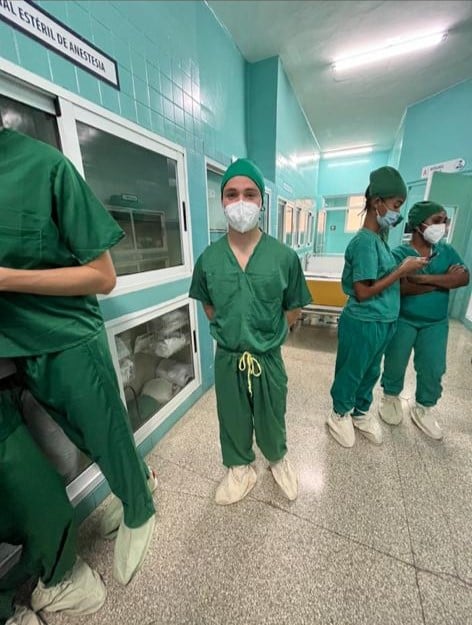LUMC students go abroad: 'Main reason to study in Leiden'
Students from the Kilimanjaro Christian Medical Centre (KCMC) in Tanzania and Leiden University Medical Centre (LUMC) pose for a group photo.
&width=710&height=710)
LUMC has invested significantly in setting up this study abroad program in recent years, ensuring that the experience is not just a fun trip, but provides a steep, scientific learning curve. This applies to both LUMC students and the local students and supervisors who participate. LUMC lecturers and coordinators travel along and thereby exchange teaching experiences with lecturers in the host countries.
During the third year of the various bachelor’s programs at LUMC, students can do an elective course in Cuba, Indonesia or Tanzania. In those countries, they conduct research for four weeks and work with local colleagues to conduct fieldwork, lab and data analysis. Students also write a paper and present their research results at the partner university and upon their return to LUMC.
Experiencing surgeries and deliveries
The 20-year-old Sem Teeken (photo right) is a Biomedical Sciences student. He reports from Cuba: "The opportunity to go abroad was one of the main reasons for me to study in Leiden. In order to experience (bio)medical science from a broader, global perspective. I chose to do the half minor Global Health Cuba. You first take a few weeks of classes in the Netherlands and then spend a month in Cuba."
The program consists of visits to general practices, hospitals and various specialist institutions. This allows you to have a lot of contact with patients, attend surgeries and experience deliveries. Furthermore, we work with a buddy on a research project and conduct interviews with Cubans."
"On the weekends, we take fun trips around the island. When you are aware that the situation in Cuba is totally different than in the Netherlands, and you are able to open yourself up to this, it is a great experience and a real addition to the study programme."
A special and exciting opportunity
Jet Vroemen (20) is a medical student. She writes from Tanzania: "I chose to join this half minor program in Infections in Health and Disease in Tanzania because I thought it was a very special and exciting opportunity to see what the medical world in Tanzania would be like. I hoped to learn a lot from the Tanzanian students participating in the program and also explore the Tanzanian culture."
"The Tanzanian and Dutch supervisors guided us through the whole program. The Tanzanian students were very welcoming and made us feel like we could ask anything."
"We went to four secondary schools in and around the city of Moshi to do fieldwork. We learned a lot from talking to school children and doing medical check-up tests. Then we had to come up with our own research question, analyze the collected samples and process them in the lab. This was all new, but very educative because the researchers helped us with the challenges we faced."
Working in a different culture
 Puck Versteegh (20) is a Biomedical Sciences student. She writes from Indonesia: "For my half minor, I chose Infections in Health and Diseases in Indonesia. During the minor, you first get lessons in the Netherlands about infectious diseases. Then you go to the Indonesian city of Makassar for four weeks to research parasitic infections in children on your own."
Puck Versteegh (20) is a Biomedical Sciences student. She writes from Indonesia: "For my half minor, I chose Infections in Health and Diseases in Indonesia. During the minor, you first get lessons in the Netherlands about infectious diseases. Then you go to the Indonesian city of Makassar for four weeks to research parasitic infections in children on your own."
"That research starts with collecting samples and data in schools. Then you will process these samples yourself in the lab (photo left). Finally, you do a data analysis to come to a conclusion and write a paper."
"Indonesian students also join the studies. It was very fun and educational to work with people from a different culture, of which you also get to know more that way. During the minor you have to work hard, but fortunately there is still time on the weekends for fun trips."
Presenting the research results
The students returned this week. On Friday, Nov. 10, the students from Indonesia and Tanzania will present their research results at a final symposium and give poster presentations in the foyer of the education building (Building 3). Interested parties are welcome to come and watch between 1:30 and 3:30 pm.
Video: LUMC-studenten in Makassar, Indonesië.

